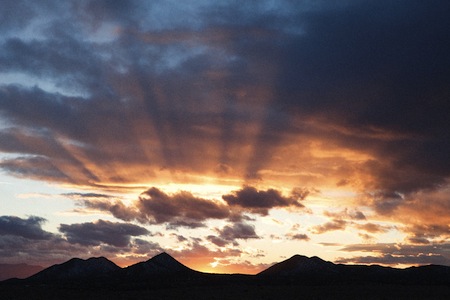Three months since the death of her son, Emily Rapp discusses the guilt she faces as life charges on.
Today marks the three-month anniversary of my son Ronan’s death. It’s spring now, and he died in late winter, in the early hours of a bitterly cold morning. Now the birds are out, chirping and fighting for nest space on the roof. Green buds have blossomed on the trees in the front yard. In the evening, just before the sun goes down, the wind feels warm, even summery.
I wish I could enjoy this. It doesn’t mean that I don’t love the New Mexico sunsets as much as I always have, or that I can’t appreciate the unique color of blue that fits into the window frame at dusk, but enjoyment makes me feel guilty. Why Ronan and not me? This is the echo of an old, wishful bargain: that I could have traded places with him. My life for his, a very epic, Biblical trade. This is my body, given for you. Guilt is normal, of course, because when someone has died and you have not, you walk through the world with the lost shadow of that person’s potential and possibilities, like the shadow of a shadow, a true ghost.
Meanwhile, the world charges on. One is expected, even after the death of a child, after the death of anyone, really, to get back to normal, and quickly. You can only be a mourner for so long. We must go back to work, which is a part of survival, we must be appropriate dinner party guests, we must pay bills and do chores. We must cheer up, go on.
But we must also be appropriately sad. You sure seem fine; how do you do it? I’ve been asked, as if I have not been sad enough. This unsolicited comment makes me feel cold-hearted, and my response, you have no idea how sad I am, is probably not appreciated either. I wish I could spend a few months wearing black, wandering around an island during the day, a place that is Grecian and bright and bare, the sea in the distance, doing nothing but walking and sitting before returning to my real life at night. Slowly, slowly, I’d spend less time on the island. Seasons would change, my hair would grow long and change color. Just as I was transformed, so too would be my view of the world, my sense of hope and hopefulness.
What does it mean to survive? I’m learning this slowly, and it’s not unlike adjusting to the weather of different seasons. It means moving from startling moments of sadness—a flash-sob—to a feeling of underwater numbness, where you see the world through a rainy windshield, and with every breath you have to wipe away, wipe away, wipe away, but everything is blurred, then clear, blurred, then clear, until you feel like you’re not seeing anything at all. Bitter moments, of course, when you’d like to bury all the seemingly happy people in snow, just for a moment. And then, of course, those bright hot moments of rage, grief’s summer season, when you argue against whatever trauma has happened to you or happened to another. There are only so many stories in the world, and all of us will be the star of one involving suffering at some point or another.
We are not allowed extended daily island wanders, which is why poetry has become so useful to me, a form of writing that is somehow able to cut through all the private weather of grief and just be clear. It is this, it is that, it is here, it is not there. This singularity is both deeply specific and universally generous. Poetry is to be moved through, and the best poets make us want to move through their words the way we, as survivors of our children or our parents, our spouses or pets or closest friends, wish to move through the world in the wake of a gutting absence: accompanied by images grounded in the everyday, but that still hold within them a sense of mystery, an aura of “what comes next?”
Anna Akhmatova, one of my favorite Russian poets, wrote this on February 17, 1911:
The door is half open,
The lindens smell sweet…
On the table, forgotten,
A riding crop and a glove.
The yellow circle of the lamp…
I’m listening to rustlings.
Why did you go?
I don’t understand…
Tomorrow morning will be
Joyful and bright.
This life is beautiful,
Heart, just be wise.
You are completely exhausted.
Your beating is fainter, more muffled…
You know, I read somewhere
That souls are immortal.
Survivors rustle around in the world, in emotion, in the strange and unpredictable weather of grief. We burst into tears at the sight of a bib, a favorite piece of jewelry, a street sign. Then our laughter might raise a roof. And then we walk out into the day, connected to all those mourners who will come after us, and all of those who have gone before. It is comforting to know that in this way, we are all the same.
Emily Rapp, a regular contributor to Role/Reboot, is the author of Poster Child: A Memoir (BloomsburyUSA, 2007) and The Still Point of the Turning World (Penguin Press, March 2013). She is a professor of creative writing and literature at the Santa Fe University of Art and Design in Santa Fe, New Mexico.
Related Links:

